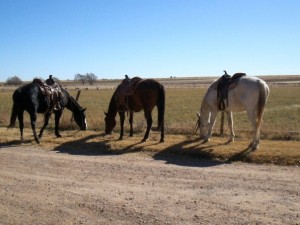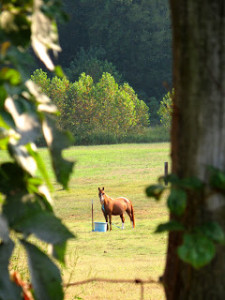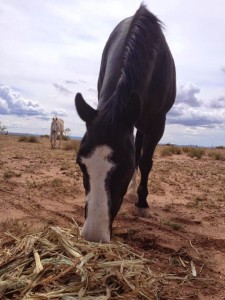*This article is not a substitute for the advice of an attorney.*
The parties have completed briefing before the 5th Circuit Court of Appeals in the much-watched case involving claims that the AQHA’s rule banning registration of cloned horses violates state and federal antitrust statutes. A federal jury found in favor of the plaintiff’s last summer and the AQHA has now appealed that decision. [Read more about the jury verdict here.] An overview of the parties’ arguments is below. If anyone would like a copy of the briefs, please call or email me and I would be happy to send them your way.
AQHA’s Arguments
The AQHA focused specifically on the following issues in arguing the jury verdict should be reversed: (1) There was no concerted agreement existed among separate economic actors, (2) “elite quarter horses” are not a relevant market product, (3) there was no actual injury to competition caused by the rule, (4) AQHA has no power to control price or competition in any market, (5) AQHA’s rule was based upon a legitimate business purposes, and (6) the verdict violates the non-intervention doctrine.
Section 1 Claim
In order to succeed on their Section 1 Sherman Act claim, the plaintiffs must prove that (1) a contract, combination of conspiracy existed within the AQHA, (2) had the effect of restraining trade, and (3) the trade was restrained on a relevant market product. AQHA argues that the plaintiffs cannot succeed on this claim as their claims do not meet these elements.
First, the AQHA argues that there was no conspiracy to exclude cloned horses–and indeed that the AQHA cannot conspire with itself regardless. Instead, it explains that the rule was adopted pursuant to AQHA rules by the membership. Under these rules, a subcommittee known as the Stud Book Rules Committee, considered modifications to the rule and recommended that the changes be denied. Subsequently, each time, the proposals to modify the rule were rejected by a vote open to the full AQHA membership.
Second, the AQHA claims that elite Quarter Horses are not a relevant market product. The product market, argues AQHA, is Quarter Horses, for which adequate competition exists. Plaintiffs, instead, argue that it is the “elite Quarter Horse market” that was harmed by the rule. Because this is not an identifiable market, and is instead based solely on quality and price, it does not fall within the Sherman Act.
Finally, AQHA argues there is no evidence of an unreasonable restraint on trade. AQHA claims there is no proof that consumers are coerced or otherwise constrained to purchase only registered Quarter Horses. The mere fact that there is a stigma that exists for non-registered horses does not constitute a restraint on trade. Further, AQHA points out that it is not a participant in the market and has no control over consumer behavior.
Section 2 Claim
In order to succeed on their section 2 claim, plaintiffs must prove (1) a valid antitrust market exists; (2) AQHA possesses monopoly power in the market; (3) AQHA willfully maintains that power by anticompetitive or exclusionary conduct; (4) AQHA’s conduct occurs in or affects interstate commerce; and (5) plaintiffs suffered injury.
Again, AQHA argues that there is no existing “elite Quarter Horse” market rather only a Quarter Horse market, in which AQHA does not hold a monopoly as it does not sell or manufacture any products, but merely offers a registry for horses meeting its criteria. Further, AQHA argues it did not pass the rule for exclusionary reasons, but instead for valid business judgment reasons including the need to maintain integrity in the breed, to accurately record pedigrees, to respect the opinions of the majority of members, and to prevent the spread of genetic diseases.
Non-Intervention Doctrine
Lastly, the AQHA argues that even if t here were Antitrust violations, the court’s order requiring the AQHA to modify its rules overstepped its bounds. Generally, private organizations may adopt any rules so long as the rules doe not violate the law. Where rules are found illegal, a court may prohibit enforcement of the rule, but may not rewrite other provisions of the rules that are not illegal. AQHA argues that the court’s ruling oversteps these bounds by requiring the AQHA to include specific language in its private rules.
Plaintiffs’ Response
In response, plaintiffs argue that the AQHA controls entry into the Quarter Horse world and that without registration, a Quarter Horse cannot race, cannot compete in other Quarter Horse events, and is worthless for breeding. They argue the reason that the AQHA seeks to prevent registration of cloned horses is that such horses pose a serious threat to competition.
Plaintiffs argue that AQHA members on the Stud Book Committee conspired together and with the AQHA management to prevent the registration of cloned horses.
As to the “elite Quarter Horse” market, plaintiffs argue that this market consists of “the top one-half of one percent of Quarter Horses registered each year” and that but for the AQHA rule prohibiting clone registration, their horses would be included in this definition and more valuable. AQHA then argued that the only members who spoke at the Stud Book Committee meetings against registration of cloned horses were those who breed and sell elite horses, because they feared additional competition.
Next, plaintiffs argue exclusion of cloned horses harms competition within the market by preventing plaintiffs horses from competing in AQHA sanctioned events. Registering clones, they argue, would also decrease the price of horses (due to increased competition) and allow those who had not previously been able to purchase horses to become owners. Additionally, plaintiffs call the AQHA business reasons for rejecting clones “red herrings.”
Finally, plaintiffs argue that the non-intervention doctrine is inapplicable where private organization rules violate the law. Further, plaintiffs argue that all the court’s order does is to prohibit enforcement of the cloning ban, rather than the broad language that AQHA seems to believe it includes.
Amicus Curiae Brief (in support of AQHA)
Several organizations joined together to file an amicus curiae (“friend of the court”) brief in support of the AQHA. These parties include the American Kennel Club, American Morgan Horse Association, American Paint Horse Association, Appaloosa Horse Club, the Arabian Horse Association, the Cat Fanciers’ Association, the Jockey Club, the Pinto Horse Association, and the US Trotting Association. The amici argue that the trial court’s decision jeopardizes their organizational status by finding that an organization can conspire with itself, mandating particular wording be included in the rules of a private organization, and inhibiting each organization to determine whether to register cloned animals.














